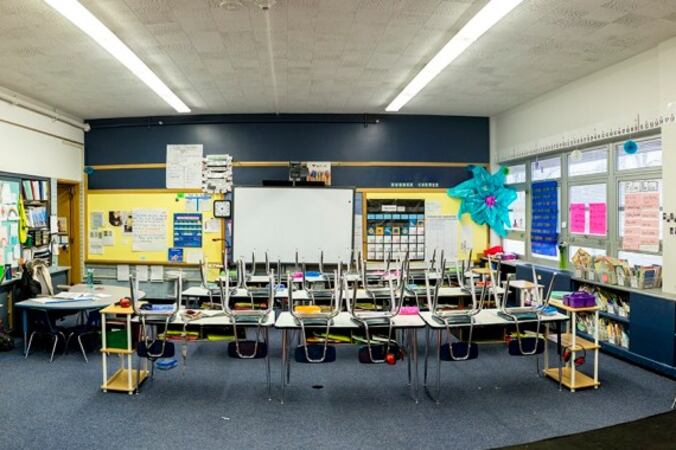Three Denver school board members want to erase the directive that prompted the superintendent to recommend closing small schools.
At the Nov. 17 meeting where the board is set to vote on Superintendent Alex Marrero’s recommendation to close 10 small schools, board members will also be asked to rescind a 2021 resolution that directs the superintendent to review under-enrolled schools and come up with options for closing some schools and consolidating their students.
“The rescission of the policy allows the board to give Marrero a new direction,” said board Vice President Auon’tai Anderson. “How do we as a board articulate our vision to the superintendent to address declining enrollment through a humane, community-supported way?”
Anderson requested that the motion to rescind the resolution be placed on the Nov. 17 agenda. Board members Scott Esserman and Michelle Quattlebuam said they support the request. It takes three board members to place an item on the agenda. A district spokesperson confirmed that the item will appear.
Those same three board members said last week that they oppose the superintendent’s recommendation to close schools. Board members Scott Baldermann and Charmaine Lindsay said last week that they were undecided. Carrie Olson said Tuesday that she is also undecided.
Board President Xóchitl “Sochi” Gaytán declined last week to say how she would vote but said she is concerned that under-enrolled schools aren’t providing students with robust services.
The lack of services for students at small schools was what prompted a previous school board to pass the resolution, officially called the Small Schools Resolution, in June 2021. Denver schools are funded per pupil, and schools with low enrollment struggle to afford enough teachers. That can sometimes lead to schools cutting electives like art or music, combining two grade levels into a single classroom, or losing bilingual programming.
Four of the current board members were either elected or appointed after the resolution was passed. Of the three others, only two — Olson and Baldermann — voted for it. Anderson was on a leave of absence when the vote took place.
The resolution directs the superintendent to work with school staff, students, parents, neighborhood groups, and advocates to come up with ideas for consolidating schools so that each elementary school has at least 300 students and two classrooms per grade.
It says the process of coming up with those ideas should be “community-led and district-supported.” And it says the superintendent should give the school board several options for consolidating schools and list the pros and cons of each.
But Marrero only presented the board with one option: a recommendation to close 10 elementary and middle schools that have fewer than 215 students, not counting preschoolers, and to reassign those students to nearby schools.
At a school board meeting last Thursday, Marrero and some board members disagreed on whether his process of arriving at that recommendation was community led.
Marrero argued that it was, because the criteria he used to identify the schools recommended for closure — 215 students or less — was developed by a committee of 34 parents, teachers, district staff members, and community advocates.
“The community, albeit a small portion of the community, was involved because they created the criteria,” Marrero said at the meeting.
Using Whittier ECE-8 as an example, Marrero said there was no way to include families from the 10 schools recommended for closure in the discussion up front “because we didn’t know that Whittier was going to be selected once we applied the criteria.”
Some board members pushed back.
“When we have not had direct conversations with the impacted communities until we have come forward with the plan,” Esserman said, “that is district led. That is not community led.”
Marrero told board members he was struggling with how to engage communities in a productive discussion that wouldn’t simply result in pleas to not close their schools.
“Yes, we can engage and perhaps there can be a different solution,” Marrero said. “But reality is — we’ve all experienced it — the answer is going to be, ‘Please do not.’ And then what?”
In interviews, Esserman and Anderson said a better approach would be to give parents, educators, and advocates the plain facts — such as, for example, that their school with 190 students can’t afford an art teacher but schools with 400 students can — and then ask them to brainstorm solutions that could include consolidation. The district has been subsidizing small schools, and officials said the subsidies are getting more expensive as enrollment declines.
At Thursday’s meeting, Marrero said the Small Schools Resolution is prescriptive in that it calls for the district to close schools. “It doesn’t call for necessarily innovation and creativity, which is what I’m hearing” from board members, Marrero told them.
Rescinding the resolution, Anderson and Esserman said, would allow the board to be clearer about what it wants. For them, they said, that’s a process that ends not with a list of schools from the superintendent but a list of options from the community.
“It takes more time,” Esserman said, “but we have a better chance of getting it right.”
Melanie Asmar is a senior reporter for Chalkbeat Colorado, covering Denver Public Schools. Contact Melanie at masmar@chalkbeat.org.





